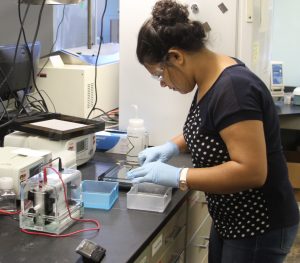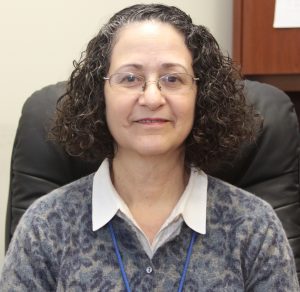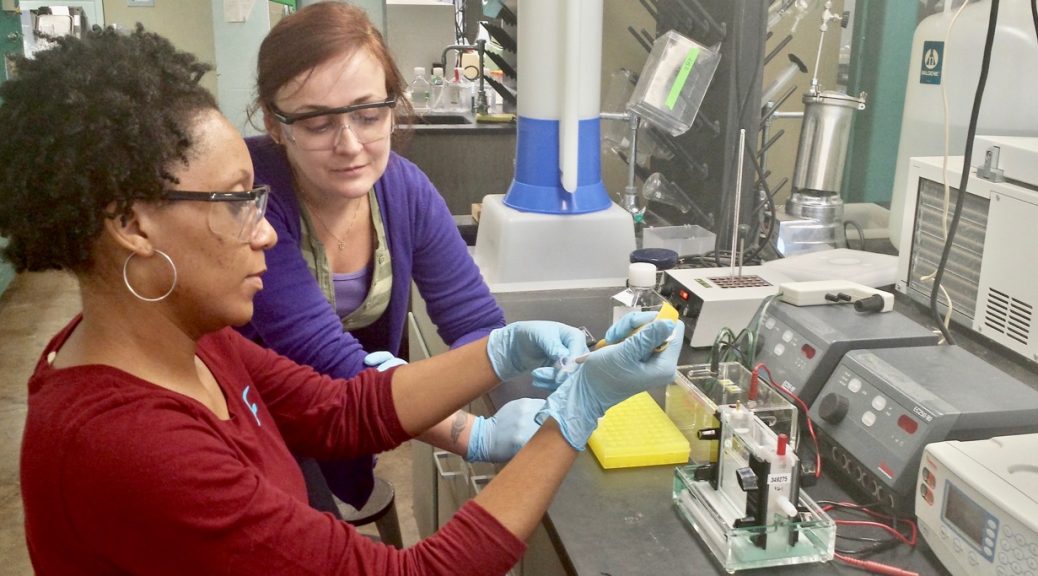NASHVILLE, Tenn. (TSU News Service) – This holiday season, cancer survivor Navita Gunter has a lot to be thankful for, mainly her life.

But she’s not content with her own personal survival. Understanding her own struggle when she was stricken with cervical cancer several years ago, and finding little compassion and help, Gunter has vowed not to let that happen to another woman.
“My struggle gave me purpose and compassion for others,” she said.
Gunter, founder of the Cervical Cancer Coalition of Tennessee, has joined TSU as head of the community advisory board for a four-component cancer research project at the university.
The U54 Partnership to Eliminate Cancer Health Disparities, refunded recently by the National Cancer Institute for another five years, is a coalition involving TSU, Meharry Medical College and Vanderbilt University. Its goal is to create a model for eliminating disparities in cancer through education, prevention and treatment.
The components of the project are community outreach and engagement, smoking cessation, breast cancer awareness, and cancer research education.

“The intent of this award is to reduce health disparities,” said Dr. Margaret Whalen, professor of chemistry, who heads the cancer research education component. “The specific disparities we are looking at is the disparity between the vast majority of people and certain groups, like African American, in terms of cancer incidence.”
Whalen’s role, she said, is educating students to get them interested in doing cancer research to try to broaden the number of individuals who engage in cancer research.
“If we have more people from different backgrounds engaging in cancer research who are able to understand and deal better with the disparities, they will be more interested in trying to address the situation.”
Although there has been substantial progress in cancer treatment, screening, diagnosis, and prevention over the past several decades, addressing cancer health disparities—such as higher cancer death rates, less frequent use of proven screening tests, and higher rates of advanced cancer diagnoses—in certain populations is an area in which progress has not kept pace, according to the National Cancer Institute.
Documented cancer health disparities include substantially higher rates of prostate cancer incidence and death among African American men than men of other racial/ethnic groups; and higher rates of kidney cancer among American Indian and Alaska Natives than other racial/ethnic groups.
Mariam Boules is Dr. Whalen’s student and a senior biology major with minors in psychology and chemistry. She said exposure to the cancer research has been enlightening.
“The research is teaching me a lot of new things,” Boules said. “Having to do hands-on in the lab for about eight hours a day and enjoying the stuff you are doing and learning about; all those compounds and how they affect our system and our cells is just amazing.”

In the case of smoking cessation, TSU scientists are looking at tobacco use and the health disparities it presents, especially the incidence of lung cancer death rate among African-American men.
“Our role at TSU is the design of behavioral intervention,” said Dr. Rebecca Selove, a clinical psychologist and research associate professor, who heads the smoking cessation component of the project. “This entails telling people about the program, and giving them information in general about how important it is to get that support if they are tobacco users.”
Selove said the intervention would be designed along with the Cancer Outreach Corp, and would involve counseling people about cessation and motivating them to sign up and stick with the program.

Dr. Oscar Miller, chair and professor of sociology, heads the outreach component. He coordinates and maintains the activities of the community advisory board, which is comprised of experts in government and community organizations, whose mission is to help reduce cancer disparities and also to disseminate cancer research findings and information.
“One of the things we do is look at the researchers, or the research that is ongoing, and try to find community partners who have some expertise in that,” Miller said. “We meet about four times a year to discuss upcoming research projects, new areas of research, and help the researchers at the three institutions on how to include the community findings in their research.”
Gunter is excited about the cancer research, and what the future holds.
“The TSU project has expanded the research effort in this area and helped me touch more people than what I was touching before,” she said.
TSU’s involvement in cancer research, in particular, is far-reaching. Recently, renowned cancer specialist and TSU alum, Dr. Edith P. Mitchell, was part of a panel that made recommendations to help speed the development of cancer cures.
The Blue Ribbon Panel of scientific leaders and cancer patient advocates was formed to provide direction for Vice President Joe Biden’s National Moonshot Initiative, which aims to make more therapies available to more patients, while also improving efforts to prevent cancer and detect it at an early stage.
“As members of the panel, we were able to take what we know from experience and working with cancer research to come up with these recommendations, which we are certain will help the vice president in his work,” Mitchell said.
Department of Media Relations
Tennessee State University
3500 John Merritt Boulevard
Nashville, Tennessee 37209
615.963.5331
About Tennessee State University
With more than 9,000 students, Tennessee State University is Nashville’s only public university, and is a comprehensive, urban, co-educational, land-grant university offering 38 undergraduate, 25 graduate and seven doctoral programs. TSU has earned a top 20 ranking for Historically Black Colleges and Universities according to U.S. News and World Report, and rated as one of the top universities in the country by Washington Monthly for social mobility, research and community service. Founded in 1912, Tennessee State University celebrated 100 years in Nashville during 2012. Visit the University online at tnstate.edu.
